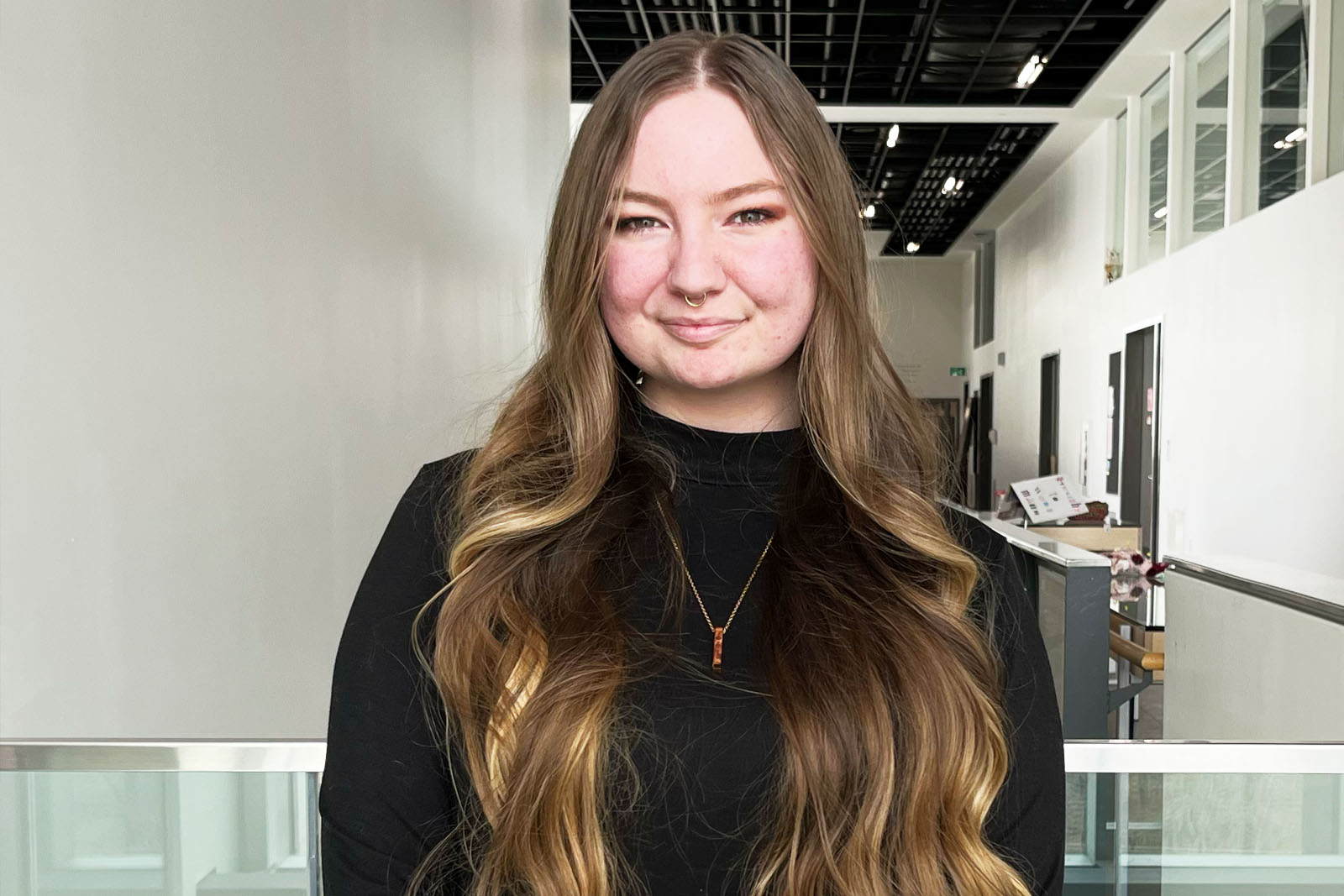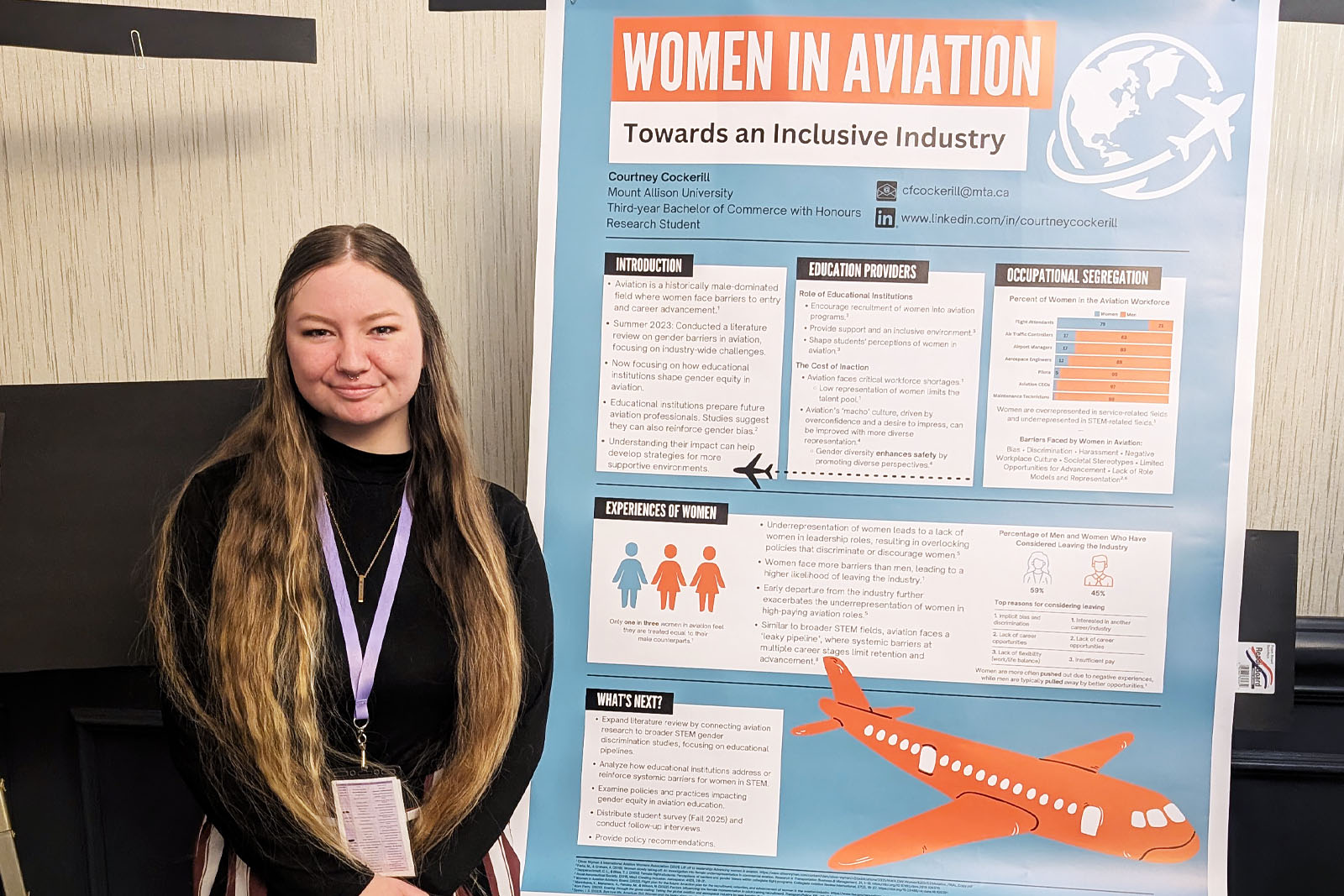Sky's the limit
Aviation has long been a male-dominated field. In Canada, approximately 7% of pilots identify as female and women continue to face systemic and societal barriers within the industry, from rigid training requirements to underrepresentation in the field. But at Mount Allison, students and faculty are working on changing that narrative.
For Commerce student Courtney Cockerill of Caledonia, NS, the aviation program at Mount Allison has provided an opportunity to conduct extensive research on women in aviation training at the undergraduate level.

Cockerill received funding for an Independent Student Research Project entitled Towards Inclusive Aviation, under the guidance of Commerce Professor Dr. Rachelle Pascoe-Deslauriers. Her research explores the question, “what role do educational institutions play in mitigating or enabling barriers for women in aviation?”
“The importance of this research can be understood through the ‘leaky pipeline’ phenomenon, which describes how women leave a career path at multiple points along its progression at a greater rate than men, resulting in a disproportionately low number of women reaching senior levels,” says Cockerill. “In aviation, the pipeline begins with early exposure to aviation as a career option, continues through post-secondary education and flight training, and extends into professional employment.”
Currently, much of the research on women in aviation focuses on the recruitment of post-secondary students or the retention of women working in the industry.
There remains a gap in the knowledge about the post-secondary stage and the experiences of women in these educational institutions. Understanding the role of educational institutions at this early stage can help prevent women from leaving the field and allow schools to offer better support to women.
Mount Allison’s aviation program combines flight training with a full university degree, offering a flexible, immersive experience. It’s one of only a few programs in Canada that allow students to earn an undergraduate degree while completing both flight and ground school training. The program is offered through a partnership with MFC Training, one of the leading flight training establishments in North America.
The program offers students significant choice and flexibility in how they begin their training and structure their degree in Science, Commerce, or Arts. While each stream is intensive and has strict requirements, students have many opportunities to tailor their program to their career goals.
Although much progress is still needed within the field, Mount Allison has already taken tangible steps to make aviation education more inclusive. The program now offers on-campus flight simulators for an immersive experience and the Aviation Society supports students through networking opportunities as well as resources for mental health and well-being.

“One of the most exciting things about the future of aviation is how many women have already broken barriers for those coming after them. Those currently in senior positions are very passionate about bringing more women into the industry and supporting them in their careers,” says Cockerill.
“Since post-secondary school is often many people’s first introduction to the industry, this is also where biases often begin. It is important that educational institutions such as Mount Allison recognize this and actively work to challenge biases and stereotypes so that when students graduate, they do so with the mindset of supporting their peers. Entering the industry should be about hard work, not about gender, race, class, or any other identity marker. Students then carry that attitude into their careers, helping to improve the overall culture and future of aviation.”
Throughout the years, Mount Allison’s aviation program has also worked to connect women to national events like the Canadian Women in Aviation (CWIA) conferences. Aviation alumna Kianna Lavigne (‘23) of Dartmouth, NS, says that during her time in the program, she attended the CWIA conference, which allowed her to connect with many other women in aviation — and she continues to attend these conferences today.
“I think the biggest challenge or barrier for women entering aviation today would be the ability to see other women working in the aviation field. If young women can see other women working in aviation, they’ll be more likely to follow,” says Lavigne.
In February 2025, Lavigne transferred from Air Borealis where she was on the Twin Otter for almost 1.5 years. Now she is flying with PAL Airlines based out of Halifax on the Q400.
Lavigne says Mount Allison prepared her significantly for her role within aviation, including rigorous study in a short period of time and at any given hour.
“I think it’s important to mention, when we say ‘aviation’, many of us immediately think of pilots,” says Cockerill. “While my research is focused on pilots because of our aviation program here at Mount Allison, aviation is much larger than that – it’s aircraft maintenance engineers, air traffic controllers, airport operations staff, airport managers, aircraft dispatchers, and many others. Aviation is a massive industry, yet women remain underrepresented in nearly all areas except lower paying service roles such as desk agents or flight attendants. Despite this, women across the industry are working hard to break the glass ceiling and challenge the historical ‘aviation is male’ stereotype. I’m excited to see aviation continue to open up for women — and to be part of that change as I enter the industry.”


